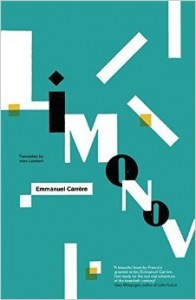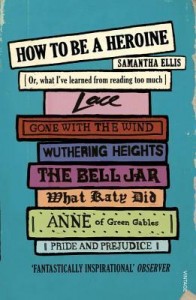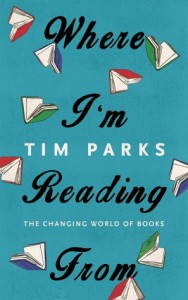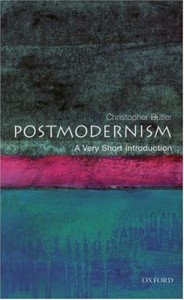 I went into the month of September with an overly ambitious ‘to-be-read’ pile. If you saw my first blog post of the month “September’s Reading List of Doom” you would know there were fifteen books on the TBR pile. I normally object to having a TBR list, I much prefer to read on a whim and just pick up what I feel like reading. However I had so many books that I needed to read; it was a combination of books from the library and planned book-club/buddy-reads. In the month of August I did manage to complete sixteen books, granted there was a weeklong readathon and six were consumed during that time. I had a feeling I would fail this TBR but I was determined to at least get on top of my pile and tick off the majority of these books.
I went into the month of September with an overly ambitious ‘to-be-read’ pile. If you saw my first blog post of the month “September’s Reading List of Doom” you would know there were fifteen books on the TBR pile. I normally object to having a TBR list, I much prefer to read on a whim and just pick up what I feel like reading. However I had so many books that I needed to read; it was a combination of books from the library and planned book-club/buddy-reads. In the month of August I did manage to complete sixteen books, granted there was a weeklong readathon and six were consumed during that time. I had a feeling I would fail this TBR but I was determined to at least get on top of my pile and tick off the majority of these books.
September is my favourite month of the year, not just because it is my birthday (today) and my wedding anniversary back on the 9th, but also I tend to spend a lot of time reflecting on my blog and this year, also my BookTube channel. I really enjoyed contemplating the past and the future for my passions and while I get anxious and I want to achieve so much, I still find it useful to reflect. It helps me to refocus and evaluate my priorities. Currently I have around twenty reviews to write, edit and post on the site; I have been doing some mini-reviews but I still plan to write something for everything I read. I like the idea of having a record of my entire reading life (or at least since starting this blog). I want to do so much more with this site but first I need to get on top of the backlog.
In reflecting I have also been thinking about the frequency of library visits. I love the library and recently I have been using this fantastic resource a little too much; it got to a point where 90% the books I read in a month came from the library. I have been trying to find a decent balance, I want to continue to using the library but I need to read books on my shelves as well. In September, I was able to hit a nice balance, 40% of all books came from the library, leaving the other 60% from my own library (40% physical copies, 20% from Audible). I am very happy with this balance and I hope to be able to continue this ratio. Out of the six books I borrowed from the library, I finished five and currently in the middle of the sixth.

Another issue I reflected on was the speed I read books; I have a love/hate relationship with reading goals and I need to work out a solution. From the readathon last month and the overly ambitious TBR this month, I have been thinking about the concept of quality over quantity. I want to be able to read bigger books, not worry about the amount of books I read and take extra time. Readathons are fun and you know I hate TBRs, however they tend to push me to read faster or pick shorter books. I do not want to spend my time calculating how many shorter books I can read while reading something much bigger. Also with the case of The Valley of the Dolls (will talk about this novel later), I want to be able to take my time and not worry about schedules or numbers.
One action that was recommended to me a few times to help manage my priorities and to understand where to focus my energy was starting a journal. I love the idea of journaling, and I want to get into the habit, but I am failing to do so. I hope to get into the habit, I also think a more detailed wrap up (and maybe more journal type posts) will help me develop some journalist type skills. I have started with dot-point journaling but I just need to remind myself to write down my thoughts every day. I have discovered my thoughts must be very boring that do not share my interests; I spend a lot of time thinking about literature, blogging and vlogging.
Getting to the books I have read this month; I have competed eleven in total. The first book, surprisingly made the Man Booker shortlist. This was Satin Island by Tom McCarthy, and I found myself really enjoying this novel. I knew nothing about corporate anthropology; I did not know how it would work in an office environment. I really enjoyed learning the corporate anthropology but I never thought it would make the Man Booker shortlist. I thought it was too experimental, post-modern in its approach. The novel had no real plot, or character development but still made for an excellent reading experience. Full credit to Tom McCarthy for writing this.
I am a part of a book club that meets monthly at my favourite independent bookstore, this month we had to read The Little Paris Bookshop by Nina George. This is a German novel, which was translated into English by Simon Pare and it tells the story of a bookseller who runs a book barge that is often referred to as a literary apothecary rather than a bookshop. I will not say too much about this novel, but let’s just say my notes for this book included words ‘overly-sweet’, ‘clichéd’, and more words along the same effect.
I had the pleasure of buddy-reading Bonjour Tristesse and A Certain Smile by Françoise Sagan with the amazing Stephanie from the BookTube channel Time to Read!. If you have not had the pleasure of watching videos from BookTube, then I will recommend starting with someone like Steph. Françoise Sagan has got a little bit of hype recently, thanks to Waterstones’ Rediscovered Classics series. The tag line for this series of books is ‘the best books you’ve never read’ and I can honestly say that I never heard of Françoise Sagan till very recently. Françoise Sagan is a French novelist from the 1950s, and the book I read featured a new translation by Heather Lloyd. Originally when Bonjour Tristesse was translated into English, it was censored but the new translation aligns more with the original text. I recommend reading Bonjour Tristesse if you have never considered it; it reminds me of The Sorrows of Young Werther when it comes to angst.
When I was a new reader, I read The Handmaid’s Tale but Margret Atwood and while I enjoyed it, I struggled to see why it was held in such great regard. This month I re-read this modern classic and now I can see it. There is one line that really stuck with me that really summed up what the novel is about; “There is no such thing as a sterile man anymore, not officially. There are only women who are fruitful and women who are barren, that’s the law.” I am sure many people know about The Handmaid’s Tale, and I was just a little late to the party when it comes to understanding its appeal. The joys of re-reading have become clearer to me and now that I consider myself well-read (to some extent) I plan to re-visit many other classics, maybe even Lady Chatterley’s Lover.
My next book was a Chuck Palahniuk novel, and I probably do not even need to mention the title, because I feel like that is interchangeable. I read Fight Club a few years ago and this other novel follows a very similar format. I expected misogyny, attempts to shock the reader and some kind of psychological twist. Seriously, are all of Chuck Palahniuk’s novels the same? I do not think I need to read any more.
While half way through The Three-Body Problem by Liu Cixin I found out it won the Hugo Award for Best Novel. I was reading this novel because I suspected it might be similar to Russian Sci-Fi, where it would explore the social-political of Communist China. Translated by Ken Liu, The Three-Body Problem did explore life in China in a far different way. There were a lot of references to science, philology and the China’s Cultural Revolution. It reminded me of the old science fiction novels from the 1960s and with the translator notes left by Ken Liu everything just worked for this one.
I really enjoy listening to non-fiction with Audible, I think the structure just works for the medium. Listening to Quiet: The Power of Introverts in a World That Can’t Stop Talking by Susan Cain was a great experience. As a very introverted introvert, I was fascinated with the history of how introverts are treated and surprised how much of it is still relevant today. The world is very focused on extroversion and I just enjoyed spending a little time learning about the introverts. Pop-psychology books have become a favourite of mine in recent time, after listening to The Lucifer Effect recently and I plan to read (or listen) to so many more.
Before I picked up The Devil’s Detective by Simon Kurt Unsworth, I attempted to predict the themes and motifs within the novel. The problem with that is how accurate I was in my predictions and ruined my enjoyment of this light read. The good news is I am probably improving in critically analysing a book and I am able to spot themes and techniques with ease. I know I have a lot more to learn but I have to wonder the price I will pay. It is possible that this was just an average novel and I will still enjoy dissecting better books. I will have to try this again and see how I go with a book that I am more likely to enjoy.
I have already mentioned Valley of the Dolls by Jacqueline Susann earlier on. I enjoyed this novel so much, I wanted to slow down and take my time. There is something interesting about the way Susann talks about feminist issues that really stuck with me. From the three women in the book, I think Jennifer was my favourite, she was such a strong character, but I will not spoil it for the people that have not read Valley of the Dolls. There is something about a cult classic that I love, maybe it is just the counter-culture element that interests me so much.
The final book I read was Between the World and Me by Ta-Nehisi Coates, which is a letter he wrote to his teenage son trying to explain the world. Beautifully written and awfully confronting, this is a book that Toni Morrison calls “required reading”. I have to agree with her, the state of the world, especially when it comes to racism, is awful and a little more understanding and compassion could only do good. I really love the way Ta-Nehisi Coates writes, it makes me want to read everything he has written.
I managed to read eleven books this month; it was not the fifteen that I had planned but still impressive. I will not set myself a TBR again for October, but it is Spooktober and I will probably read some darker fiction; maybe not horror but we shall see. Currently I am still working through A Brief History of Seven Killings by Marlon James, Candide by Voltaire (translated by Theo Cuffe) and How to Read Literature Like a Professor by Thomas C. Foster, so I will probably finish those three books in October. There are a few books I would like to read but I have learnt not to plan my reading so much; I am just glad it did not end in a slump. How was your reading month?

 Title: A Little Life (
Title: A Little Life ( Title: Limonov (
Title: Limonov ( Title: Nest (
Title: Nest ( Title: One Night in Winter (
Title: One Night in Winter ( Title: A Dog's Heart (
Title: A Dog's Heart ( Title: How To Be a Heroine (
Title: How To Be a Heroine ( Title: Where I'm Reading From: The Changing World of Books (
Title: Where I'm Reading From: The Changing World of Books ( Title: Postmodernism: A Very Short Introduction (
Title: Postmodernism: A Very Short Introduction ( Title: My Reading Life (
Title: My Reading Life ( Title: Girl At War (
Title: Girl At War ( Title: The Russian Debutante's Handbook (
Title: The Russian Debutante's Handbook ( A new TV show discovery for me is the Lifetime show UnREAL, which chronicles a dating reality show (similar to The Bachelor) called “Everlasting”. This is told mostly from the perspective of Rachel Goldberg (Shiri Appleby), a producer of the show who was brought back by the executive producer (Constance Zimmer) after an epic breakdown during the previous season. Rachel has to find the balance between rebuilding her reputation, the high demands of producing the show and her own mental health.
A new TV show discovery for me is the Lifetime show UnREAL, which chronicles a dating reality show (similar to The Bachelor) called “Everlasting”. This is told mostly from the perspective of Rachel Goldberg (Shiri Appleby), a producer of the show who was brought back by the executive producer (Constance Zimmer) after an epic breakdown during the previous season. Rachel has to find the balance between rebuilding her reputation, the high demands of producing the show and her own mental health.